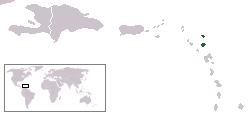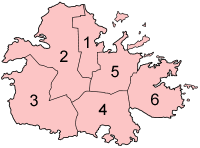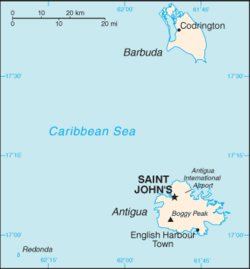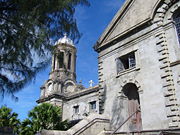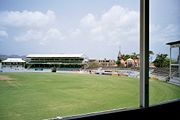Antigua and Barbuda
2008/9 Schools Wikipedia Selection. Related subjects: Americas; Countries
| Antigua and Barbuda | ||||||
|---|---|---|---|---|---|---|
|
||||||
| Motto: Each Endeavouring, All Achieving | ||||||
| Anthem: Fair Antigua and Barbuda Royal anthem: God Save the Queen 1 |
||||||
|
|
||||||
| Capital (and largest city) |
Saint John's |
|||||
| Official languages | English | |||||
| Demonym | Antiguan, Barbudan | |||||
| Government | Parliamentary democracy and federal constitutional monarchy | |||||
| - | Head of State | Elizabeth II | ||||
| - | Governor-General | Louise Lake-Tack | ||||
| - | Prime Minister | Baldwin Spencer | ||||
| Independence | from the United Kingdom | |||||
| - | Date | November 1, 1981 | ||||
| Area | ||||||
| - | Total | 442 km² ( 198th) 171 sq mi |
||||
| - | Water (%) | negligible | ||||
| Population | ||||||
| - | 2005 estimate | 82,786 ( 197th) | ||||
| - | Density | 184/km² ( 57) 394/sq mi |
||||
| GDP ( PPP) | 2005 estimate | |||||
| - | Total | US$875.8 million ( 170th) | ||||
| - | Per capita | US$12,586 ( 59th) | ||||
| HDI (2007) | ▲ 0.815 (high) ( 57th) | |||||
| Currency | East Caribbean dollar ( XCD) |
|||||
| Time zone | AST ( UTC-4) | |||||
| Internet TLD | .ag | |||||
| Calling code | +1 268 | |||||
| 1 | God Save The Queen is officially a national anthem but is generally used only on regal and vice-regal occasions. | |||||
Antigua and Barbuda (Spanish for Ancient and Bearded) is an island nation located in the eastern Caribbean Sea, on the sea's boundary with the Atlantic Ocean. There are two major islands - Antigua (IPA: /ænˈtiːgə/) and Barbuda (/bɑrˈbjuːdə/), which are close neighbors within the middle of the Leeward Islands, roughly 17 degrees north of the equator.
The islands of Antigua and Barbuda are part of the Lesser Antilles archipelago. To the south of Antigua and Barbuda lie the islands of Guadeloupe, Dominica, Martinique, Saint Lucia, Saint Vincent and the Grenadines, Barbados, Grenada and Trinidad and Tobago. Montserrat lies to the southwest; Saint Kitts and Nevis and Saint Eustatius are to the west, and Saint Barthélemy, Saint Martin and Anguilla are to the northwest.
History
Pre-ceramic Amerindians were the first to inhabit the islands of Antigua and Barbuda in 2400 BC. Later Arawak and Carib Amerindian tribes populated the islands. The island of Antigua was named Wadadli by these natives and is today called Land of Wadadli by locals. Christopher Columbus landed on his second trip in 1493 and named the island Santa Maria de la Antigua after a church in Seville, Spain. Early settlement by the Spanish was replaced by English rule from 1632 (British rule from 1707 Acts of Union), with a French interlude in 1666. Slavery, established to run the sugar plantations on Antigua, was abolished in 1834.
The islands became an independent state within the Commonwealth of Nations on November 1 1981, with Elizabeth II as the first Queen of Antigua and Barbuda and the Right Honourable Vere Cornwall Bird became the first prime minister.
Politics
The politics of Antigua and Barbuda takes place in a framework of a federal parliamentary representative democratic monarchy, whereby the Head of State is the monarch, who appoints the Governor-General as vice-regal representative. In 2007 Louise Lake-Tack became the first female to hold the position of Governor-General in the history of Antigua and Barbuda. A Council of Ministers is appointed by the Governor-General on the advice of the Prime Minister, currently Baldwin Spencer. The Prime Minister is the head of the government. Vere Cornwall Bird, Antigua and Barbuda's first Prime Minister, is credited with having brought Antigua and Barbuda and the Caribbean into a new era of independence.
Executive power is exercised by the government. Legislative power is vested in both the government and the two chambers of the Parliament. The bicameral Parliament consists of the Senate (seventeen-member body appointed by the governor general) and the House of Representatives (seventeen seats; members are elected by first past the post to serve five-year terms). The last elections held were on 23 March 2004, while the next are due in 2009. At the last elections, the Antigua Labour Party won four seats, while the United Progressive Party won thirteen.
Since 1949, the party system had been dominated by the personalist Antigua Labour Party. However, the Antigua and Barbuda legislative election, 2004, saw the defeat of the longest-serving elected government in the Caribbean. The Prime Minister, Lester Bryant Bird and deputy Robin Yearwood had been in office since 1994, when he succeeded his father, Vere Bird. The elder Bird had been Prime Minister from independence in 1981 and, before independence, had been Chief Minister of Antigua from 1960, except for the period 1971-76 when the Progressive Labour Movement (PLM) defeated them in those elections.
The Judicial Branch is the Eastern Caribbean Supreme Court (based in Saint Lucia; one judge of the Supreme Court is a resident of the islands and presides over the Court of Summary Jurisdiction). Antigua is also a member of the Caribbean Court of Justice. The Supreme Court of Appeal was the British Judicial Committee of the Privy Council up until 2001, when the nations of the Caribbean Community voted to abolish the right of appeal to the Privy Council in favour of a Caribbean Court of Justice. Some debate between member countries had repeatedly delayed the court's date of inauguration. As of March, 2005, only Barbados was set to replace appeals to the Privy Council with appeals the Caribbean Court of Justice, which then had come into operation.
Military
The Royal Antigua and Barbuda Defence Force is the country's armed force. It has 185 members.
Parishes and dependencies
The island of Antigua is divided into six parishes:
|
The island of Barbuda (1,241) and the uninhabited island of Redonda each enjoy dependency status.
The capital is the city of St. John's (population 21,514).
Geography
The country consists of a number of islands, of which Antigua is the largest and most populous. Barbuda, just north of Antigua, is the other main island. The islands have a warm, tropical climate, with nearly constant temperatures throughout the year. Redonda, another nearby island, which was annexed in the 1860s when its phosphate resources were discovered, is also the territory of Antigua and Barbuda although it has been unoccupied since 1930.
The islands are mostly low-lying with the highest point being Boggy Peak, at 402 metres (1,319 ft). The small country's main town is the capital, Saint John's, on Antigua; Barbuda's largest town is Codrington. Antigua & Barbuda combined have 365 beaches.
The Antiguan Racer is the rarest snake in the world with approximately only two hundred remaining in the wild. It is found on Bird Island, an island off the coast of Antigua.
Economy
Tourism dominates the economy, accounting for more than half of the GDP. Weak tourist arrival numbers since early 2000 have slowed the economy, however, and pressed the government into a tight fiscal corner. The dual-island nation's agricultural production is focused on the domestic market and constrained by a limited water supply and a labour shortage stemming from the lure of higher wages in tourism and construction work.
Manufacturing comprises enclave-type assembly for export with major products being bedding, handicrafts, and electronic components. Prospects for economic growth in the medium term will continue to depend on income growth in the industrialised world, especially in the United States, which accounts for about one-third of all tourist arrivals.
Demographics
The ethnic distribution consist of 91% Black, 4.4% Mixed Race, 1.7% White, 2.9% Other. The majority of the white population is ethnically Irish and British, while there are also Christian Levantine Arabs (primarily of Syrian, Lebanese and Palestinian descent) and a small population of Asians and Sephardic Jews.
An increasingly large percent of the population live abroad, most notably in the United Kingdom ( Antiguan Britons), United States and Canada. A minority of the Antiguan residents are immigrants from other countries, particularly Dominica, Guyana and Jamaica with an increasing number of immigrants from the Dominican Republic, St. Vincent and the Grenadines and Nigeria. There is also a significant population of American citizens estimated at 4500 people which would make it one of the largest American citizen populations in the English speaking Eastern Caribbean.
Almost all Antiguans are Christians (74%), with the Anglican Church (about 44%) being the largest denomination. Catholicism is the other significant denomination, with the remainder being other Protestants: including Methodists, Moravians, Pentecostals and Seventh-Day Adventists. There are also Jehovah's Witnesses. Non-Christian religions practiced on the islands include Rastafari, Islam, Judaism, and Baha'i.
Language
The official language of Antigua and Barbuda is English, but many of the locals speak Antiguan Creole. The Barbudan accent is slightly different from the Antiguan one. Spanish is also widely spoken in certain communities in Antigua where immigrants from the Dominican Republic make up large numbers.
In the years before Antigua and Barbuda's independence, Standard English was widely spoken in preference to Antiguan Creole, but afterwards Antiguans began treating Antiguan Creole as a respectable aspect of their culture. Generally, the upper and middle classes shun Antiguan Creole. The educational system dissuades use of Antiguan Creole and instruction is done in Standard (British) English. The higher up one goes on the socio economic ladder, the less prevalent Antiguan Creole becomes, to the extent that some Antiguans will even deny that they speak or understand Antiguan Creole
Many of the words used in the Antiguan dialect are derived from British and also African origins. The dialect was formed when enslaved Africans owned by British planters imitated the 18th century English spoken by their masters; utilizing traditional African language structures they created an African-English hybrid or pidgin. This can be easily seen in some phrases like: "Me nah go" meaning "I am not going". Another example is: "Ent it?" meaning "Ain't it?" which is in itself dialect and means "Isn't it?". Common island proverbs often can be traced to Africa.
Culture
The culture of Antigua and Barbuda is predominantly British which is evident throughout many aspects of the society. American popular culture also has a heavy influence. Family and religion play an important role in the lives of Antiguans. There is a national Carnival celebration held during August each year. Historically, Carnival commemorates the abolition of slavery in the British West Indies. The annual Carnival includes pageants, shows, contests and festive activities and is a notable tourist attraction.
Calypso and soca music are important in Antigua and Barbuda and Burning Flames is a popular band.
Sport
Like in many commonwealth countries, cricket is the most popular sport. The 2007 Cricket World Cup was hosted in the West Indies from 11 March to 28 April 2007. Antigua hosted eight matches at the Sir Vivian Richards Stadium, which was completed on 11 February 2007 and can hold up to 20 000 people at full capacity. Antigua is also a Host of Stanford Twenty20 - Twenty20 Cricket, a version started by Allen Stanford in 2006 as a regional cricket game with almost all Caribbean islands taking part. Viv Richards is from Antigua and scored the fastest Test Century also Brian Lara twice scored the World Test Record at Antigua Recreation Ground.
Association football is also a very popular sport. Antigua has a national football team albeit inexperienced.
Athletics is also popular. Talented athletes are trained from a young age and Antigua and Barbuda have produced a few fairly adept athletes. Janill Williams, a young athlete with much promise comes from Gray's Farm, Antigua. Also, Sonia Williams and Heather Samuel have represented Antigua and Barbuda at the Olympic Games. Others prominent rising stars include Brendan Christian (100 m, 200 m), Daniel Bailey (100 m, 200 m) and James Grayman (High Jump).
Education
The people of Antigua & Barbuda have a high level of literacy at well over 90%. In 1998, Antigua and Barbuda adopted a national mandate to become the preeminent provider of medical services in the Caribbean. As part of this mission, Antigua and Barbuda is building the most technologically advanced hospital in the Caribbean, the Mt. St. John Medical Centre. The island of Antigua currently has two medical schools, the American University of Antigua (AUA), founded in 2004 and The University of Health Sciences Antigua (UHSA), founded in 1982.
There is also a government owned state college in Antigua as well as the Antigua and Barbuda Institute of Information Technology (ABIIT). The University of the West Indies has a branch in Antigua for locals to continue University studies.
With the onset of the Internet more Antiguans are completing online degrees.
Foreign relations
Antigua and Barbuda is a member of the United Nations, the Commonwealth of Nations, Caribbean Community, Organisation of Eastern Caribbean States, Organization of American States, World Trade Organization and the Eastern Caribbean's Regional Security System.
Antigua and Barbuda is also a member of the International Criminal Court (with a Bilateral Immunity Agreement of protection for the US-military as covered under Article 98).


